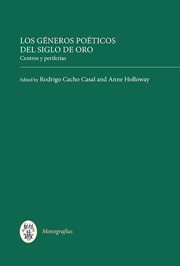Book contents
- Frontmatter
- Dedication
- Contents
- Índice de ilustrationes
- Índice de colaboradores
- Introducción: Géneros, centros, periferias
- I DEL CENTRO A LA PERIFERIA: GÉNEROS Y CONTRAGÉNEROS
- 1 La épica áurea como poesía
- 2 Estatuto y lenguaje del género lírico entre Garcilaso y Góngora
- 3 La humilde sumisión de ornato huye. Epístola y poesía lírica en el Siglo de Oro
- 4 Aproximación al ethos del locutor burlesco
- II AGUDEZA, RETÓRICA Y EMBLEMÁTICA
- III GÓNGORA Y SU ESTELA
- IV POESÍA COLONIAL: EL NUEVO CENTRO
- V LA POESÍA Y SUS MARCOS: MANUSCRITOS, ANTOLOGÍAS, MISCELÁNEAS
- Bibliografía
- Índice onomástico
2 - Estatuto y lenguaje del género lírico entre Garcilaso y Góngora
from I - DEL CENTRO A LA PERIFERIA: GÉNEROS Y CONTRAGÉNEROS
Published online by Cambridge University Press: 05 September 2013
- Frontmatter
- Dedication
- Contents
- Índice de ilustrationes
- Índice de colaboradores
- Introducción: Géneros, centros, periferias
- I DEL CENTRO A LA PERIFERIA: GÉNEROS Y CONTRAGÉNEROS
- 1 La épica áurea como poesía
- 2 Estatuto y lenguaje del género lírico entre Garcilaso y Góngora
- 3 La humilde sumisión de ornato huye. Epístola y poesía lírica en el Siglo de Oro
- 4 Aproximación al ethos del locutor burlesco
- II AGUDEZA, RETÓRICA Y EMBLEMÁTICA
- III GÓNGORA Y SU ESTELA
- IV POESÍA COLONIAL: EL NUEVO CENTRO
- V LA POESÍA Y SUS MARCOS: MANUSCRITOS, ANTOLOGÍAS, MISCELÁNEAS
- Bibliografía
- Índice onomástico
Summary
‘Proxima heroicae maiestati lyrica nobilitas’, escribía Julio César Escalígero, y al cabo de un par de décadas le hizo eco Fernando de Herrera, en las Anotaciones: ‘Después de la magestad eroica dieron los antiguos el segundo lugar a la nobleza lírica’. Es muy oportuno, pues, que en un volumen de autor colectivo dedicado a los géneros poéticos durante el Siglo de Oro le corresponda a la lírica el ‘segundo lugar’, al lado de la épica, lo que me permite desarrollar alguna consideración general —pero no demasiado genérica, confío— sobre el género poético que, a través de un largo proceso hecho de lentas metamorfosis y de rupturas radicales, está destinado a subvertir la jerarquía de los géneros, llegando a conquistar la hegemonía sobre la escritura en versos. Este proceso de sustancial superposición de poesía y lírica que tuvo su momento de máxima aceleración con la crisis del sistema literario clasicista, conoció, sin embargo, una fundamental fase originaria a partir del siglo XVI, durante la que la poesía renacentista y barroca española desempeñó un papel y dio una aportación, ambos para nada irrelevantes.
- Type
- Chapter
- Information
- Los géneros poéticos del Siglo de OroCentros y periferias, pp. 31 - 48Publisher: Boydell & BrewerPrint publication year: 2013



